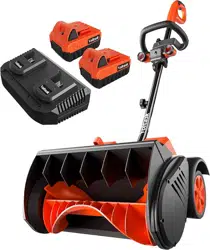Loading ...
Loading ...
Loading ...

BATTERY AND CHARGER SAFETY INSTRUCTIONS 08
Information About the Battery
SS-40A
●
●
●
●
●
●
Do not burn or incinerate battery packs. Battery packs may explode, causing personal injury or damage.
Toxic fumes and materials are created when battery packs are burned.
Do not crush, drop, or damage battery packs. Do not use the battery pack or charger if it has
sustained a sharp blow, been dropped or run over, or been damaged in any way (e.g., pierced with a nail,
hit with a hammer, or stepped on).
Do not disassemble. Incorrect reassembly poses a serious risk of electric shock, fire, and/or exposure to
toxic battery chemicals.
Battery chemicals cause serious burns. Never let a damaged battery pack contact the skin, eyes, or
mouth. If a damaged battery pack leaks battery chemicals, use rubber or neoprene gloves to safely dispose
of the pack. If skin is exposed to battery fluids, wash the affected area with soap and water, and rinse with
vinegar. If eyes are exposed to battery chemicals, immediately flush with water for 20 minutes and seek
medical attention. Remove and dispose of contaminated clothing.
Do not short-circuit. A battery pack will short-circuit if a metal object makes a connection between the
positive and negative contacts on the battery pack. Do not place a battery pack near anything that may
cause
a short circuit, such as paper clips, coins, keys, screws, nails, and other metallic objects. A short-circuited
battery pack poses a risk of fire and severe personal injury.
Store your battery pack and charger in a cool, dry place. Do not store the battery pack or charger
where temperatures may exceed 105℉/40.5℃, such as in direct sunlight or inside a vehicle or metal
building during the summer.
1.
2.
3.
4.
5.
6.
7.
8.
9.
10.
11.
The battery pack supplied with your cordless snow shovel is only partially charged. The battery pack has to
be charged completely before you use the tool for the first time.
For optimum battery performance, avoid low discharge cycles by charging the battery pack frequently.
Store the battery pack in a cool place—ideally at 77℉/25℃—and charged to at least 40%.
Lithium-ion batteries are subject to a natural aging process. The battery pack must be replaced no later
than
when its capacity falls to 80% of its capacity when new. Weakened cells in an aged battery pack are no
longer capable of meeting the high-power requirements needed for the proper operation of your snow
shovel and therefore pose a safety risk.
Do not throw battery packs into an open fire, as this poses a risk of explosion.
Do not ignite the battery pack or expose it to fire.
Do not exhaustively discharge batteries. Exhaustive discharge will damage the battery cells. The most
common cause of exhaustive discharge is lengthy storage or disuse of partially discharged batteries. Stop
working as soon as the performance of the battery falls noticeably or the electronic protection system
triggers. Place the battery pack in storage only after it has been fully charged.
Protect batteries and the tool from overloads. Overloads will quickly result in overheating and cell damage
inside the battery housing, even if this overheating is not apparent externally.
Prevent damage and shocks. Immediately replace batteries that have been dropped from a height of more
than 1 yd. or those that have been exposed to violent shocks, even if the housing of the battery pack
appears to be undamaged. The battery cells inside the battery may have suffered serious damage. In such
instances, please read the waste disposal information for proper battery disposal.
If the battery pack suffers overloading and overheating, the integrated protective cutoff will switch off the
equipment for safety reasons.
Use only original battery packs. The use of other batteries poses a fire risk and may result in injuries or an
explosion.
Loading ...
Loading ...
Loading ...
